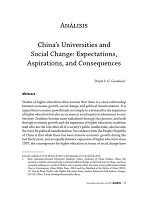China´ s Universities and Social Change: Expectations, Aspirations, and Consequences
DOI:
https://doi.org/10.32870/mycp.v4i12.490Abstract
Studies of higher education often assume that there is a close relationship between economic growth, social change, and political transformation. It is argued that economic growth leads not simply to a demand for the expansion of higher education but also an increase in social equity in admissions to uni- versities. Students become more radicalised through this process; and both through economic growth and the expansion of higher education, academic staff who are the core after all of a society’s public intellectuals, also become the voice for political transformation. The evidence from the People’s Republic of China is that while there has been massive economic growth during the last thirty years, and an equally dramatic expansion of higher education since 1997, the consequences for higher education in terms of social change have been considerably more limited. Moreover, while there have been some voices for limited political transformation from staff and students, the demands for regime change that might have been expected given the experiences of other countries are virtually non-existent.Downloads

Published
How to Cite
Issue
Section
License
Open Access Policy
This journal provides open access to all its contents, in adherence to the principle that making research freely available supports a greater global exchange of knowledge.
MyCP is licensed under a Creative Commons Attribution-NonCommercial license, also known as CC BY-NC.
Contents are published in both PDF and XML formats.
Authors who publish in México y la Cuenca del Pacífico must accept the following conditions:
Pursuant to Mexican copyright laws, México y la Cuenca del Pacífico acknowledges and respects the authors’ moral right and ownership of property rights, which will be assigned to the University of Guadalajara to publish the articles in an open-access mode.
México y la Cuenca del Pacífico does not charge the authors any fees for receiving and processing their articles.
Authors are permitted to enter into other independent and additional contractual agreements for the non-exclusive distribution of the article version published in México y la Cuenca del Pacífico (for example, publishing it in an institutional repository or in other printed or electronic media) as long as they clearly state that the piece was originally published in México y la Cuenca del Pacífico.
Pursuant to the above, once the article is approved for publication, authors must send the Assignment of Rights Agreement form duly filled and signed. This form must be sent to mexicoylacuenca@gmail.com as a PDF file.
Readers/users of México y la Cuenca del Pacífico can freely access the journal new issues as soon as they are uploaded. Readers/users are allowed to cite, share (both electronically and physically), print and distribute the material, provided they expressly state that the work was originally published in México y la Cuenca del Pacífico. Contents are to be properly cited and never for commercial purposes.




